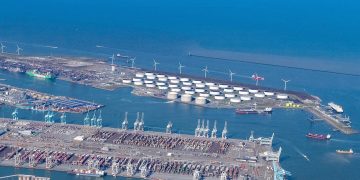In an exclusive interview to SAFETY4SEA, Francesca Fairbairn, Oceans Programme Manager, Institute for Human Rights and Business (IHRB), raises the alarm over the criminalisation of seafarers—a growing and serious issue that ranks alongside crew abandonment as one of the most pressing challenges facing seafarers today.
Francesca points out that seafarers on vessels with a higher likelihood of abandonment are often those who have paid recruitment fees, highlighting a strong correlation between fee payment and crew abandonment. She also suggests that, rather than focusing solely on enhancing seafarers’ resilience, more effort should be directed toward improving onboard conditions. In this regard, it is encouraging to see that discussions around seafarers’ rights and welfare have significantly increased over the past five years. However, despite this progress, many industry players still fall short—not only of good practice but also of basic legal and ethical standards.
SAFETY4SEA: Can you explain IHRB’s role in protecting and promoting human rights within the maritime industry, particularly for seafarers?
Francesca Fairbairn: IHRB has had a shipping programme since 2019, which began with our briefing paper on human rights across the ship’s lifecycle – this covers shipyards, operations, ship recycling among other issues Since the 2020 pandemic, we have focused our attention on improving protection (by governments) and respect (by companies) of the rights of seafarers – crew – in particular. We do this by convening business, government and civil society representatives to collectively address key issues impacting seafarers’ rights, such as wages, working conditions, or security. Our work with seafarers is underpinned by the Seafarer Code of Conduct, which we co-developed with the Sustainable Shipping Initiative and Rafto Foundation for Human Rights in 2021 to help charterers and shipping companies respect the rights of those 1.8 million seafarers who sail the high seas keeping world trade ‘afloat’.
S4S: What are the most pressing human rights issues facing seafarers today?
Fr.F.: Seafarers have been facing increasing pressures for decades – greater workloads, less shore leave, risk of abandonment – all of which were seriously exacerbated by the 2020 pandemic. Recent armed conflicts have also spilled over into shipping lanes. Some seafarers face lack of collective bargaining agreements, poor connectivity, no free drinking water, and poor diet. Seafarers from India, Eastern Europe and Nigeria in particular are highly susceptible to having to pay illegal recruitment fees to gain positions on board ships, and this is an issue that IHRB has focused on since 2023 when we launched our first briefing on this issue.
S4S: What role does IHRB play in advocating for fair treatment of seafarers abandoned in foreign ports or caught in legal disputes?
Fr.F.: IHRB does not advocate in individual cases. We certainly continue to raise abandonment as an issue – with all stakeholders whenever we can, not least because the correlation between payment of recruitment fees and abandoned crew is strong. In other words, seafarers on board vessels which are more likely to be abandoned are more likely to have paid fees.
S4S: Criminalization of seafarers is a growing concern, with some facing unfair legal action after maritime incidents. How can they be better protected against wrongful prosecution?
Fr.F.: The criminalisation of seafarers is a cause for grave and increasing concern, expressed to IHRB by several companies, shipping associations, civil society organisations and of course unions. Indeed, the International Transport Workers’ Federation (ITF) has called criminalisation “one of the most serious problems facing seafarers today.” Specific instances vary, but commercial pressures can often be the cause, with seafarers being used as scapegoats by authorities, shipping companies and insurers all seek to find someone (else) to blame. ITF published a toolkit in December 2023, which lays out clearly who should be responsible and how seafarers should be protected in particular circumstances. The joint ILO-IMO Tripartite Working Group adopted Guidelines on the fair treatment of seafarers detained on suspicion of committing crimes in November 2024 – let’s hope this is effective in ensuring public authorities treat seafarers fairly during detention.
S4S: Are you satisfied with industry’s progress on addressing seafarers’ human rights issues? What should be our next steps?
Fr.F.: Conversation around seafarers’ rights and welfare seems to have increased in the past five years. Bigger global companies are doing more to look after crews on board their ships. Big charterers are doing more human rights due diligence. But there are still many players in the industry who fall short of good or even acceptable or legal standards. Some industry leaders are indeed leading from the front, but there needs to be more effective implementation of the Maritime Labour Convention (MLC) across all vessels – by flag states and port states, as well as by companies with responsibilities for seafarers direct or indirect.
S4S: Do you think there is need for regulatory update or best practices towards to further enhance crew welfare?
Fr.F.: The use of open registries, or ‘flags of convenience’, allows companies to adhere to less stringent legal standards than those that might be in place in countries of ownership. Many open registries have now signed the MLC, but plenty haven’t, or still fall short of its standards e.g lower minimum wage requirements. Add to this that many open registries don’t have the wherewithal to ensure compliance with their laws on ships that fly their flag, meaning many flags of convenience vessels are free to sail international waters with little legal oversight of crew. ITF has been campaigning for many years to end this practice of flags of convenience – perhaps now it is time for the IMO to take more decisive action, particularly as the use of flags of convenience is now being used to facilitate the illegal passage of ‘Dark Fleet’ vessels carrying sanctioned cargo.
S4S: How should industry stakeholders work to improve life onboard and foster seafarers’ resilience?
Fr.F.: I’m not sure making seafarers more resilient is the answer – it is better to focus efforts on improving conditions for them. And there are plenty of tools out there to help – ensure ships are covered by the MLC or at least by collective bargaining agreements (ITF can assist here). Ensure ships comply with the Delivering on Seafarers Rights Code of Conduct I mentioned previously. Ship operators and managers should use RightShip’s Crew Welfare Self-Assessment Tool to assess levels of compliance with the Code of Conduct. All of these tools have plenty of ideas for improving life onboard. To help tackle the issue of recruitment fees, do your due diligence on crewing agencies – make sure they do not charge seafarers recruitment fees (a widespread problem in India and Eastern Europe in particular). Above all treat your workforce – crew – fairly and with dignity.
S4S: How do crises such as environmental disasters and geopolitical conflicts impact seafarers’ rights?
Fr.F.: Environmental disasters can lead to unfair criminalisation of seafarers and infringements on their rights, as seen in high profile incidents such as the Wakashio case. Geopolitical conflicts too can have significant impacts on seafarers’ safety. The conflict in Israel and Gaza prompted the Houthis to attack commercial vessels in the Red Sea – many of which have no connection with Israel. This posed considerable dangers to merchant crew in the area. We’ve also already mentioned the ‘Dark’ or ‘Shadow’ Fleet that is proliferating due to sanctions against Russian oil since the invasion of the Ukraine, and using crew who are subject to substandard conditions, and placed in unnecessary danger due to the potential increased risk of collision and the use of aging ships.
S4S: What actions should we take to collectively create an inclusive and attractive industry and improve the industry’s image for the younger generation?
Fr.F.: The old adage that you join the navy and see the world is barely applicable these days. Crew numbers are down leading to greater individual workloads, shore leave is less, ports are often outside city centres and costs of travel prohibitive. On top of that, pay can be poor, recruitment fee debt crippling. In order to attract the best talent, a career in the merchant navy needs to be marketed as something desirable – and that will be achieved by treating crew with respect and dignity, and by obeying the law.
S4S: If you could change one thing across the industry from your perspective, what would it be and why?
Fr.F.: Awareness of the tools that exist to protect seafarers, such as MLC, as well as core human rights standards for business conduct more broadly via the UN Guiding Principles on Business and Human Rights. So if it were one thing it could be summarised as widespread awareness and adoption of international norms and standards to respect human rights.
S4S: What advice would you give to maritime industry leaders, policymakers, and other stakeholders to further promote and protect the human rights of seafarers
Fr.F.: The crew are your most precious cargo. Treat them as such. Use all the tools available to do this – the norms, standards and guidance that already exist. Reach out to organisations like IHRB who are working together with all stakeholders across maritime industries to apply these tools and problem-solve shared challenges.
The views presented are only those of the authors and do not necessarily reflect those of SAFETY4SEA and are for information sharing and discussion purposes only.



























































